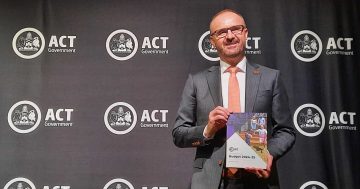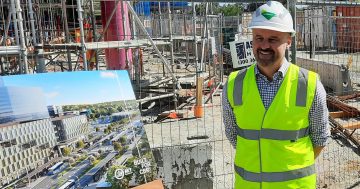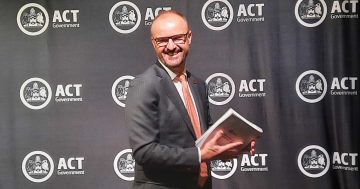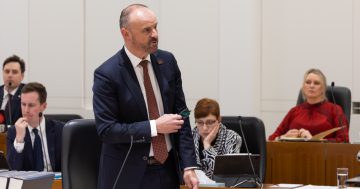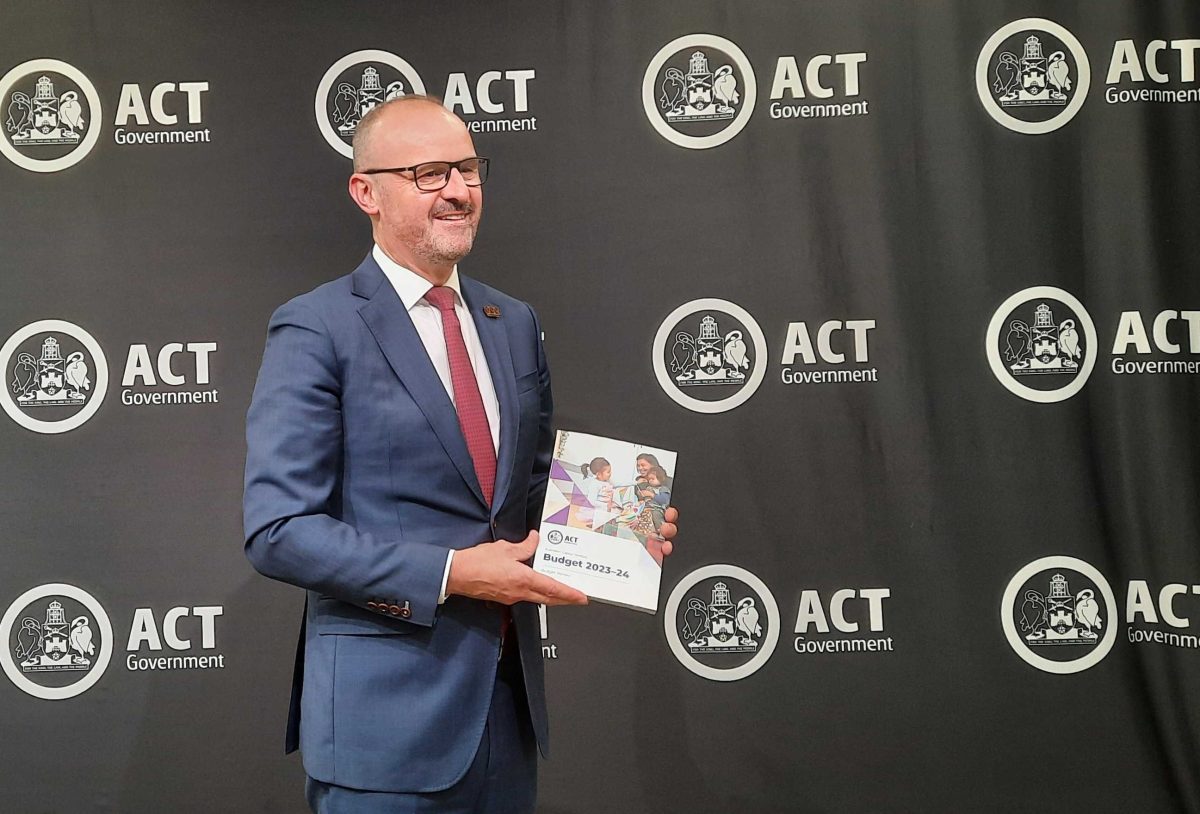
Chief Minister and Treasurer Andrew Barr with the Budget Review: the Territory can’t afford not to fund necessary infrastructure. Photo: Ian Bushnell.
Chief Minister and Treasurer Andrew Barr has defended his government’s ambitious infrastructure program amid a deteriorating budget position and ballooning debt.
Today’s mid-year Budget Review reveals that revenue hits, higher spending and increased interest payments have blown out the expected 2023-24 ACT Budget deficit by $340 million.
The 2023-24 deficit is now expected to be $782.8 million, with another higher-than-expected deficit in 2024-25 before the Budget returns to surplus, albeit slightly lower than forecast, in 2025-26 ($100 million) and 2026-27 ($145 million).
Mr Barr said the economy and the Budget were expected to recover as interest rates stabilised or hopefully fell, along with inflation, although he admitted there was a risk that might not eventuate.
A slump in GST payments as consumers cut back on their spending and payroll tax due to the Australian Public Service’s shift away from consultants and contractors to employing its own staff has contributed to a $189 million hit to revenue in 2023-24 and $99.2 million over the four years to 2026-27.
At the same time, the government will have $169.4 million more in total expenses this financial year and $619.8 million more over the forward years.
The Budget review shows extra spending of $170.6 million on services and infrastructure in 2023-24 and $308.8 million over the forward years, much of which has already been announced.
An increase in borrowing costs and extra borrowings has added $80.8 million to interest payments over the four years, while net debt has also grown by about $180 million to be $7.4 billion (an expected 13.7 per cent of Gross State Product) in 2023-24, and will now increase over the forward years to $11.6 billion in 2026-27.
Borrowings this year total $13.4 billion and will increase over the four years to $18.4 billion, with interest payments more than doubling from $334 million to $685 million in 2026-27, reflecting the government’s long-term infrastructure program.
Asked whether the ACT could afford it, Mr Barr said the question should be, can the Territory afford not to fund necessary infrastructure?
“The alternative is to delay,” he said.
But he said the government was looking to reduce the impact on the Territory’s balance sheet by attracting Commonwealth funding in 50:50 partnerships and through complementary asset sales, such as land, particularly for new housing.
He said a number of projects would not be able to proceed without Commonwealth support.
Mr Barr said the infrastructure program was operating at full pelt at a little over $1 billion a year and he hoped to cover that from a combination of the operating cash surplus, Commonwealth contributions and asset sales.
He would welcome a couple of interest rate cuts to reduce the cost of forward borrowings, but the ACT had taken advantage of the ultra-low rates available during the pandemic.
Opposition Leader Elizabeth Lee said that due to Mr Barr’s poor economic management taxes would have to increase to pay for the debt.
“The figures we are seeing out of this Budget Review are staggering,” she said. “To service Andrew Barr’s staggering debt, Canberrans will be paying almost $2 million a day in interest repayments alone.
“Canberrans are right to ask, where has all the money gone?”
Ms Lee said Mr Barr was now expecting federal Labor to bail him out.
The slump in Commonwealth payments to the ACT includes $58.9 million less GST, although this is expected to recover in coming years, and $39 million in grants, but this is offset by an increase in other Commonwealth grants of $219.8 million over the four years to 2026-27, mainly due to the Commonwealth’s contribution to education and skills, roads and Light Rail Stage 2A.
Payroll tax revenue is down by $58 million and is expected to be $144.4 million lower over the four years to 2026-27.
Mr Barr said if the APS switch to insourcing continued to impact the ACT Budget, he would ask the Commonwealth for some form of compensation.
Land tax revenue is forecast to be $6.6 million lower in 2023-24 but $16.7 million higher over the four years to 2026-27, while commercial stamp duty is down by $12 million ($8.9 million lower over the forward years) as interest rates uncertainty impacted the property market.
General rates and stamp duty revenue remain as forecast.
There have also been lower dividends from the Suburban Land Agency, City Renewal Authority and Icon Water, which are expected to mean $39.5 million less coming into the government coffers over the four years, partly due to a drop in land sales.
Fewer people appear to be gambling as well. Revenue from that source is expected to be $30.7 million lower in 2023-24 and over the forward years.
But other ACT-based taxation revenue is expected to be $18 million higher over the forward years, thanks to higher than expected collections from the lease variation charge in 2023-24.
The Budget Review papers say the ACT economy performed strongly in 2022-23 posting 4.3 per cent growth, and the outlook remains positive despite this year’s interest rate and cost of living headwinds.
Growth in 2023-24 is forecast to be slightly higher than expected at Budget, but moderating to 2.5 per cent and then picking up in 2024-25 and continuing to strengthen from 2025-26.
The ACT population increased by 2.2 per cent through the year to June 2023, but the government believes the ABS is still underestimating interstate migration, which can affect GST payments.
It is expected to grow strongly over the forward years by 2.25 per cent in 2024-25 and stabilise at a growth rate of 2 per cent after that.












